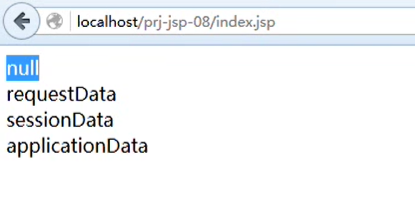index.jsp
<%@page contentType="text/html; charset=UTF-8"%> <%-- 关于JSP中的九大内置对象 内置对象 完整类名 ------------------------------------------- pageContext javax.servlet.jsp.PageContext 页面范围【页面上下文】 request javax.servlet.http.HttpServletRequest 请求范围 session javax.servlet.http.HttpSession 会话范围 application javax.servlet.ServletContext 应用范围 response javax.servlet.http.HttpServletResponse 响应对象 out javax.servlet.jsp.JspWriter 标准输出流 config javax.servlet.ServletConfig Servlet配置信息对象 exception java.lang.Throwable 异常引用(isErrorPage="true") page javax.servlet.http.HttpServlet (page = this) 很少用 --%> <%-- 主要研究下JSP中的四个作用域对象/范围对象: pageContext < request < session < application pageContext : 在同一个JSP页面中共享数据,不能跨JSP页面 request : 在同一个请求中共享数据 【使用较多】 session : 在同一个会话中共享数据 【使用较多】 application : 所有用户共享的数据可以放到应用范围中 --%> <% pageContext.setAttribute("pageContext" , "pageContextData"); request.setAttribute("request","requestData"); session.setAttribute("session","sessionData"); application.setAttribute("application","applicationData"); %> <%=pageContext.getAttribute("pageContext") %> <br> <%=request.getAttribute("request") %> <br> <%=session.getAttribute("session") %> <br> <%=application.getAttribute("application") %> <%-- <jsp:forward page="/index2.jsp"></jsp:forward> --%> <% response.sendRedirect(request.getContextPath() + "/index2.jsp"); %>

index2.jsp
<%@page contentType="text/html; charset=UTF-8"%>
<%=pageContext.getAttribute("pageContext") %>
<br>
<%=request.getAttribute("request") %>
<br>
<%=session.getAttribute("session") %>
<br>
<%=application.getAttribute("application") %>
<%--
pageContext只能在同一个JSP页面中共享数据。范围是最小的。
通过pageContext这个页面上下文对象,可以获取当前页面中的其它对象。
--%>
<%=pageContext.getRequest() %>
<%=pageContext.getSession() %>
<%=pageContext.getServletContext() %>
<%=pageContext.getServletConfig() %>

直接访问index2.jsp
